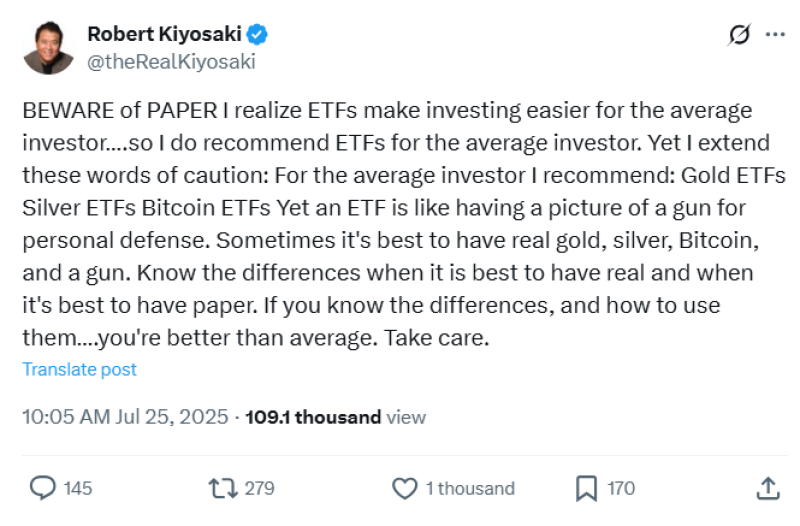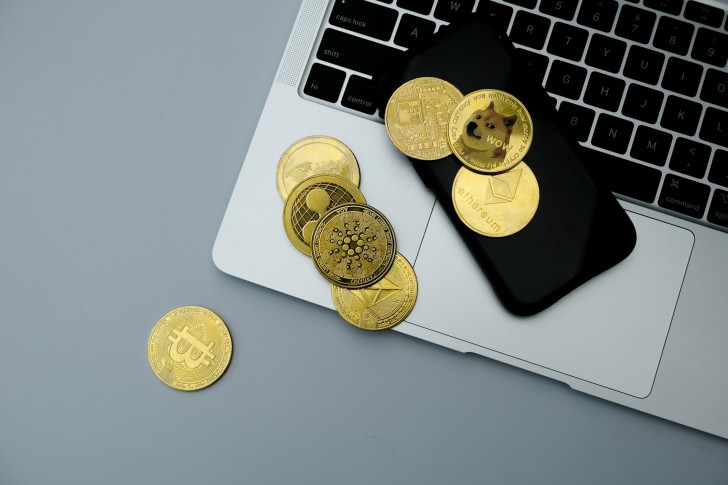Bitcoin (BTC) is back in the spotlight thanks to a reality check from one of the most well-known financial authors out there. Robert Kiyosaki just dropped some truth bombs about what it really means to "own" Bitcoin.
Why Bitcoin (BTC) ETFs Aren't Really Bitcoin Ownership
Robert Kiyosaki, the guy who wrote "Rich Dad Poor Dad," just posted something on X that's got people talking. He's not bashing Bitcoin ETFs completely – he actually thinks they're fine for regular investors. There are ETFs for gold, silver, and Bitcoin (BTC), and they serve their purpose.

But here's where it gets interesting. Kiyosaki says owning a Bitcoin ETF is like having a picture of a gun when you need to defend yourself. Sounds harsh? Maybe. But when you think about it, he's got a point. When things get really bad, that piece of paper isn't going to save you.
The "Rich Dad Poor Dad" author isn't just talking about making money in the markets. He's talking about actually owning something versus just having exposure to it. There's a huge difference, and most people don't get it until it's too late.
His whole thing is pretty straightforward: when financial systems can flip overnight (and we've seen this happen), having some digital receipt that says "you own Bitcoin" isn't the same as actually having Bitcoin (BTC) in your control. It's like the difference between having a photo of your house versus actually living in it.
The Real Deal: Bitcoin (BTC) vs Paper Promises
Here's what Kiyosaki is really getting at. Paper assets are super convenient – you can buy them, sell them, trade them without much hassle. But they all depend on one thing: trust. You've got to trust the system won't break down, trust the middleman won't disappear, and trust that when you really need your money, it'll be there.
Real assets don't need all that trust stuff. Think about it – if you've got actual Bitcoin (BTC) in your own wallet, you don't need to ask anyone for permission to use it. You don't need to hope some company is still around when you want to cash out.
Kiyosaki has always been about being prepared for the worst-case scenario. He's not just some investment guru – he's more like a financial survivalist. For him, Bitcoin (BTC) fits right in with his philosophy about owning hard assets and being self-reliant. It's not just about getting rich; it's about staying in control of your financial future.
The guy ends his post with what he calls a "relaxed warning." Basically, if you understand the difference between owning the real thing and owning paper that represents the real thing, you're already way ahead of most people. If you don't get it, well, you might think you're protected when you're really not.
Why This Bitcoin (BTC) Debate Actually Matters
Look, Kiyosaki isn't trying to scare people away from Bitcoin ETFs. They've made it easier for regular folks to get some Bitcoin (BTC) exposure without dealing with wallets and private keys and all that technical stuff. That's actually pretty great for adoption.
But his point is worth thinking about. What happens if the ETF company goes under? What if there's some regulatory nightmare? What if the whole traditional financial system has a meltdown? If you've got paper Bitcoin, you're basically stuck hoping someone else will sort it out for you.
With actual Bitcoin (BTC), you're not hoping. You've got the keys, you've got the coins, you've got control. Sure, it's more work to keep them safe, but when push comes to shove, they're yours and nobody can take them away.
Kiyosaki's been preaching this stuff for years – own real assets, be prepared, don't depend on systems that can fail. Bitcoin (BTC) actually fits perfectly into this mindset because it was designed to work without needing banks or governments or any middlemen at all.
The bottom line? There's nothing wrong with Bitcoin ETFs if you understand what you're getting. But if you think owning shares in a Bitcoin ETF is the same as owning Bitcoin (BTC), you might want to think again. As Kiyosaki puts it, when the stakes are high, paper won't protect you – only the real deal will.
 Usman Salis
Usman Salis

 Usman Salis
Usman Salis


